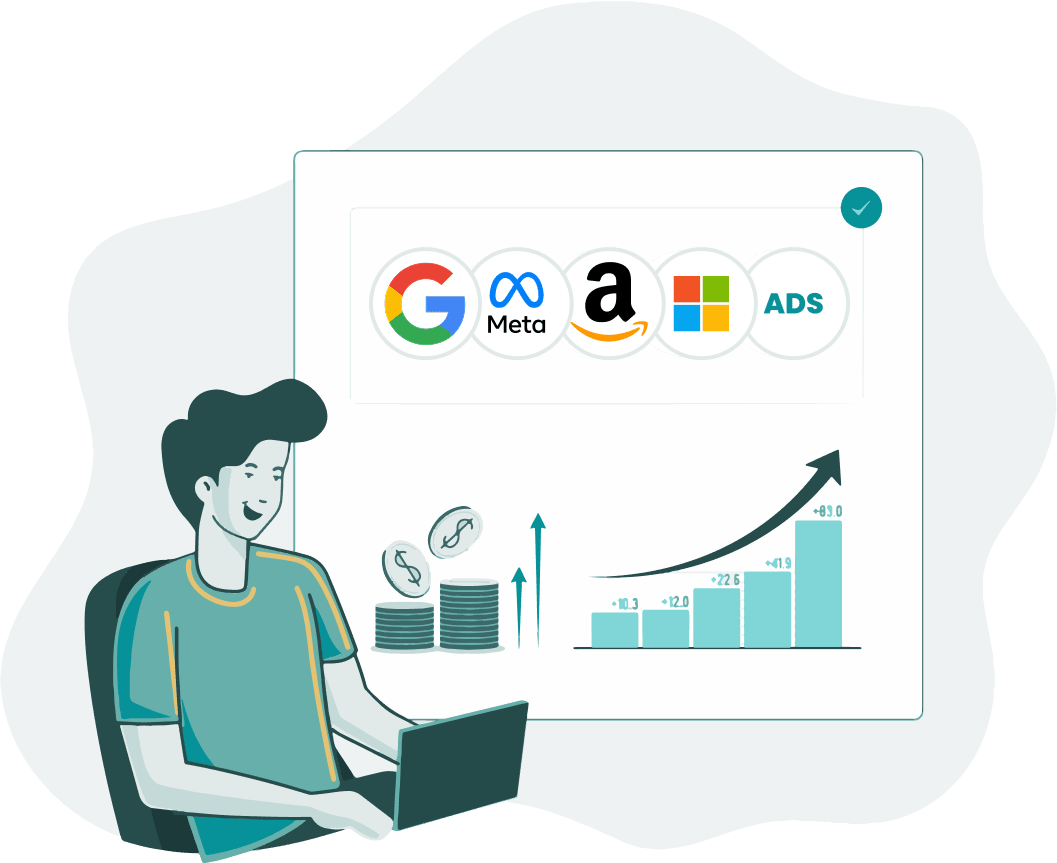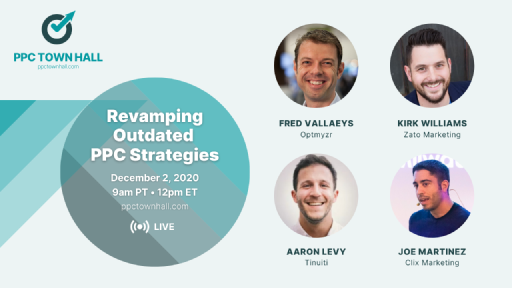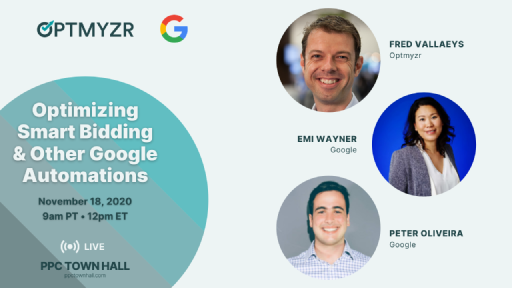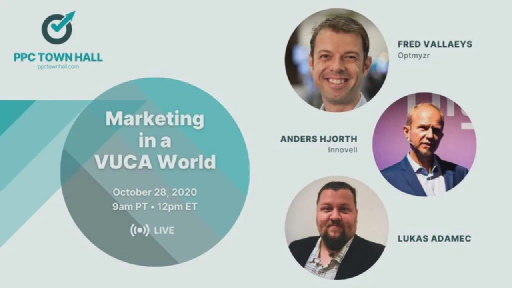It’s true: the right bidding strategy can decide the fate of your PPC accounts.
With the ever-changing dynamics of search marketing, marketers need to be extra careful navigating the tough waters of bid management. Moreover, they also need to be conscious of Google’s take on limiting search query reports and pushing new limits on data access.
In order to gain big on leads, we have to do more than just focusing on bidding strategies. Metrics like quality score, tCPA, ROAS, etc., can also play a big role in influencing bid management.
So this week on episode 23 of PPC Town Hall, we discussed tips and tactics by specialists to improve your bid management for good lead generation and e-commerce.
Our panelists for the week:
- Navah Hopkins, Director of Paid Media, Hennessey Digital
- Frederick Vallaeys, Co-Founder, Optmyzr
- Geetanjali Tyagi, Co-Founder, Optmyzr
As always, you can view this week’s episode as well as previous editions of PPC Town Hall right here.
Here are 5 tips that experts swear by to manage bids for leads and e-commerce.
1. The changing face of Search Terms Reports

Navah: Initially, when it was announced that the Search Terms Reports were being depreciated, I didn’t think much of it. Ultimately, you’re still gonna be able to see the click data, the keyword data, and your ROASes. It’s not that you’re getting fewer clicks, you’re just not getting that transparency on the queries.
But now, I think it is an actual problem as I have noticed an under-spending issue. Not being able to see where the budget is being funneled is really a problem. My theory is that a lot of the spend is being directed to local service ads rather than paid search. Local service ads come at a dramatic discount, without any pre-requirement of running a paid search ad.
Apart from this, there is no transparency for different automation strategies that are either underperforming or overperforming.
2. SKAGs vs STAGs
Navah: Lately, I’ve been pushing far more broad match ad groups and campaigns, especially with how much the match types have changed. The allocation of budget to broad match and exact match keywords seems much higher than phrase match keywords. Now, I’m finding one broad match skag, 3-4 exact match keywords, and then maybe one mod broad serves better than focusing on only exact/phrase.
The choice to use a match type or a keyword is entirely dependent on what I’ll see coming back in search terms. Did they match by the rules of exact? Or did exact close variants matched by the rules of broad, etc.,? The fact that we no longer have that visibility truly, is a bit of a problem.
In terms of delivery in account performance, I still see that STAGs (grouping of keywords) seems to perform better than SKAGs. In terms of match type, I’m very much pulling away from phrase match as they tend to get caught quite more in the delivery problem.

Fred: Match types don’t mean what they used to be earlier. With the loosening of the match types, most people can not figure out what a phrase match can achieve that another match type wouldn’t. For people, who haven’t been doing PPC quite that long, a phrase match meant that the words between the quotes were supposed to stay together. But that doesn’t actually work anymore.
Geetanjali: With the whole match types changing and close variants coming in, people who swear by SKAGs have still not completely let go. With the search terms changes, the whole alpha-beta structure of mining keywords using your broad match and then moving them to exact might not work that well. You probably don’t know all the search queries that are coming in with your broad match keywords, whether it’s SKAG or otherwise.
3. Let’s talk bidding

Navah: Bidding is one of those tactics that you should just delegate out. There isn’t a good reason to do truly manual bidding. Manual bidding can be helpful when you don’t trust native automation to bid enough for your important terms, however, there is no good reason to sit there adjusting bids all day. Use scripts/rules, or you can use an amazing tool like Optmyzr.
Geetanjali: If you are using smart bidding, it’s really important to send the right data into the system. I also think that having the right level of attribution is needed as well. I have come across customers who are completely using Google’s automated bidding strategies and running on last-click attribution. So, the system is automatically cutting the queries that would rise on top of the funnel, conversions and these customers keep wondering why it’s not working.
Also, if you’re delegating your bidding, you need to know which parts you’d be choosing. If you still have to set the right targets, you still have to have the attribution model, then that’s the part that you can’t delegate to Google. If you don’t give the system the right data, the systems, which are after all machines, can’t make the right decision.
4. The problem with AI and Maximize Conversions
Navah: Two things play here. One, in your Conversion settings, you can tell Google whether to count in your conversions or not. This means you can still track actions you’re interested in without having them derail your automated/smart bidding strategies. The other thing is don’t use smart bidding if you don’t trust your conversions. Just don’t.
You actually need to have an infrastructure in place that can track the lead through. Have an open conversation with your client about their intake. Part of it comes down to helping your client and helping them build infrastructure to report and have an internal intake system. The other part is doing the legwork yourself, having call tracking metrics, checking lead quality, etc.
5. Quality of leads

Navah: We need to understand the quality of leads in accepted leads against rejected leads and why they get rejected. One thing that we found in new advertisers is that a penchant for leaving search partners on and getting conversions. But then those conversions turn out really terrible.
We make sure that every quarter that there is this buy-in and we ask some core questions. How many leads are you getting per month? Where could that number grow to? How much do you make per service vertical? Are there any upcoming changes in this quarter that we need to be aware of?
Conclusion
I’ve noticed that as newer PPC managers come in who have never done manual bid management, they lack the understanding of how to manage bids or how the auctions work.
For some reason, people tend to believe that putting in a bid or a target for tCPA or tROAS is enough to walk away. That’s certainly not okay. Google is automating the conversions between expected conversion when you’re trying to achieve in terms of CPA and putting the bids in the auction.
But remember this: it doesn’t look at anything to do with your business! It doesn’t necessarily know all the things about your business as you do. At the end of the day, your priority in the type of leads you want should be reflected in your targets.
Keep in mind that nothing is fixed as we know them to be. Keep testing and discussing ways to make the most of your accounts.
Seasoned PPC professionals turn to efficient bid management tools, like Optmyzr, to keep their accounts top-notch and drive good leads. Try and experience our capabilities yourself by signing up for our 14-day free trial. Full access to all our features, credit card free!









